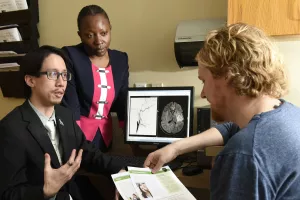Neuromuscular disorders are a large group of conditions that interfere with your ability to control the muscles you need to walk, talk and eat. Neuromuscular disorders are complex conditions, but we’re here to keep you moving and help your muscles function at their best.
Understanding neuromuscular disorders
If you've been diagnosed with a neuromuscular disorder, there is a lot of new information to think about and understand. We're here to help explain your condition, create an individualized treatment plan and answer any questions.
First, let's start with what neuromuscular disorders are. Neuromuscular disorders disrupt communication between muscles and nerves causing muscles to weaken and wear away over time.
The disorders can be inherited or passed down in families or from spontaneous gene changes, known as genetic mutations. Other causes can include inflammation, poisoning, tumors, toxins and complications from autoimmune disorders. Sometimes the cause is unknown.
Symptoms can appear from birth to adulthood and range from mild to severe, progressing slowly or rapidly or changing over time. We'll work closely with you to take as much guesswork out of living with your condition as possible.

Conditions
We are experienced in treating a range of neuromuscular disorders with the ultimate goal of slowing disease progression. Since many neuromuscular disorders are related to or lead to other conditions, we work closely with Tufts Medicine specialties, such as primary care, rehabilitation medicine, orthopedic surgery, neurosurgery, rheumatology, ophthalmology, urology and psychiatry, to manage your overall well-being. We care for the full spectrum of neuromuscular diseases and disorders, including:
Testing
Neuromuscular disorders can be hard to diagnose because many diseases affect your body's nerves and muscles with similar symptoms. We are highly specialized in precisely diagnosing neuromuscular conditions using the latest technology.
During your first visit, we'll carefully review your medical history, discuss your overall health, perform blood and imaging tests, and perform a neurologic exam. We may also recommend tests, including:
- Electromyography (EMG) and nerve conduction studies (NCS): looks at the health of your heart and nerves
- Punch skin biopsy: a painless procedure to remove a small piece of skin to measure the density of the nerve fibers
- Forearm exercise test: a simple blood test done before or after exercising to diagnose specific disorders that affect metabolic functions
- Quantitative sensory testing (QST): monitors your ability to detect vibration, temperature or both
- Lumbar puncture (also known as a spinal tap): we remove a fluid sample by inserting a needle between two of the five bones that form your spine
- Nerve and muscle biopsies: a small piece of muscle tissue and cells are removed and examined under a microscope
Treatments
We have vast experience treating neuromuscular disorders and provide the latest treatments tailored to your needs. When developing your unique care plan, we consider your condition, progression stage and symptoms. There is no cure for neuromuscular disorders, but promising therapies can relieve symptoms, strengthen your body and prevent your condition from worsening. Treatments include:
- Medications
- Physical therapy
- Occupational therapy
- Surgery
- Clinical trials
We educate family members about your condition so they can help care for you if necessary.

From regular office visits to inpatient stays, find the healthcare you need and deserve close to home.

Meet the doctors and care team devoted to supporting you every step of the way along your path to better health.